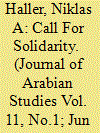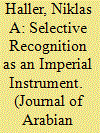| Srl | Item |
| 1 |
ID:
180355


|
|
|
|
|
| Summary/Abstract |
While the contemporary political and economic ties between the Gulf region and the Levant are widely acknowledged, the deeper historical roots of this modern relationship are rarely recognized in light of persistent narratives of the Gulf’s relative isolation before the discovery of its hydrocarbon wealth. Building on a study of the British archival record, this article contributes to a challenge of such narratives by examining one of the earliest instances in which mutual ties became manifest: the political and financial support for the Arabs of Palestine by the population of the Trucial States (the contemporary United Arab Emirates) in the interwar years. As is shown, the development of pro-Palestinian sentiment was enabled not only by an earlier expansion of education in the Trucial States, but also by rapidly developing communication links between the Gulf and the wider Arab world. As a result of these developments, the population of the Trucial States was subject to –– and proved receptive to –– calls for Arab and Muslim solidarity emanating from Palestine in the late 1930s.
|
|
|
|
|
|
|
|
|
|
|
|
|
|
|
|
| 2 |
ID:
164401


|
|
|
|
|
| Summary/Abstract |
Pursuing political objectives, Western imperial powers were selective in the inclusion of non-European polities into the realm of sovereign states. In the case of the Trucial States –– the contemporary United Arab Emirates –– Britain as the imperial power granted recognition to a regularly changing number of local shaykhdoms through the negotiation and repeated exchange of treaties, with important repercussions for the later political and urban development of the country. This article examines Britain’s decision-making regarding these recognitions from 1820–1952. Building on British archival records, it argues that the final result of seven recognized sovereign emirates was only to a very limited degree a representation of the situation as it existed on the ground. Instead it was largely the outcome of a British policy of selective recognition, driven by the strategic rationale of obtaining accountable and coercible treaty partners, and by tactical considerations such as the exclusion of imperial competitors, the erection of bases, and the obtainment of oil concessions.
|
|
|
|
|
|
|
|
|
|
|
|
|
|
|
|